Eating a balanced diet is crucial for your overall health and wellness. It helps prevent diseases, boosts your immune system, and maintains your energy levels and mental well-being. Key nutrients include vitamins, minerals, proteins, carbohydrates, and fats, all of which are essential for body functions. Incorporate a variety of fruits, vegetables, lean proteins, and whole grains into your meals, and choose healthy fats like omega-3s. Managing portion sizes and selecting nutrient-dense foods can also help maintain a healthy weight. Stay hydrated and avoid processed foods for peak health. Discover more about specific food choices and their benefits.
Key Takeaways
- A balanced diet prevents diseases and promotes overall health and wellness.
- Essential nutrients like vitamins, minerals, and macronutrients support energy production and immune function.
- Maintaining a healthy weight reduces the risk of heart disease and diabetes.
- Consuming a variety of fruits and vegetables ensures necessary nutrients and lowers obesity risk.
- Proteins are crucial for muscle growth and tissue repair.
What Is a Balanced Diet?
A balanced diet means you're eating a variety of foods from different groups to make sure you get all the essential nutrients for your health. Imagine your plate as a colorful masterpiece, featuring fruits, vegetables, whole grains, lean proteins, and healthy fats.
Each food group brings its own unique benefits to the table, like a superhero team assembling for your wellness. By mixing it up, you dodge diseases, infections, and even bad hair days! This vibrant diet doesn't just keep you looking sharp; it supports mental health and helps manage weight.
Kids grow stronger, and adults? Well, they get to age like fine wine. So, next time you think about food, remember—variety is the spice of life!
Essential Nutrients
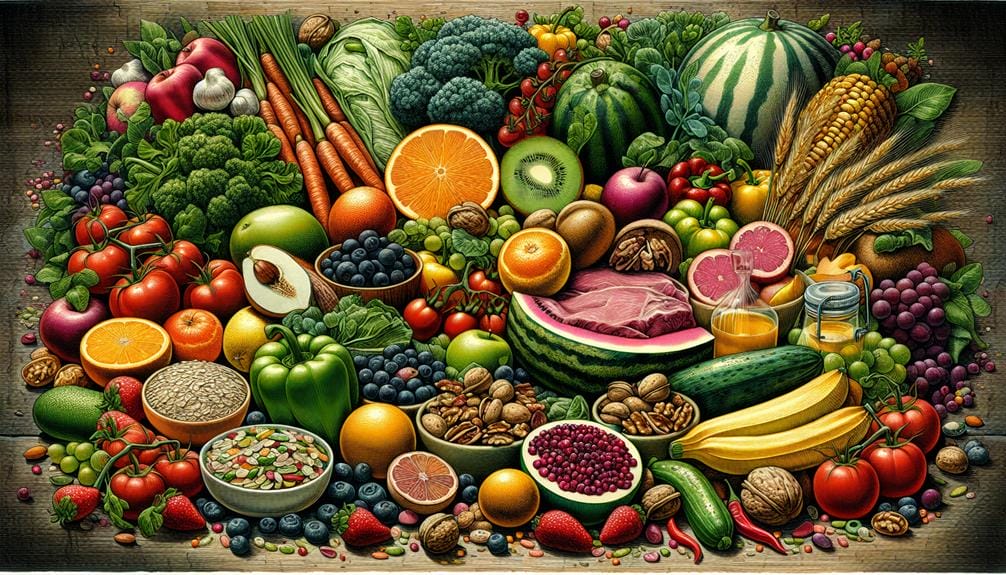
To maintain a well-rounded diet, you need to understand the role of essential nutrients like vitamins and minerals, as well as how to balance macronutrients such as carbohydrates, proteins, and fats.
These nutrients are vital because your body can't produce them in sufficient amounts. By consuming a variety of foods, you make certain that your body gets what it needs for peak health and function.
Vitamins and Minerals
Vitamins and minerals play essential roles in keeping your body functioning at its best. Think of them as the tiny superheroes of your balanced diet, swooping in to save the day. These essential nutrients are critical for everything from energy production to immune system support.
For example, vitamin C is like your immune system's personal bodyguard, while vitamin D safeguards your bones from crumbling like old crackers. Meanwhile, minerals such as iron are essential for transporting oxygen in your blood, so you don't feel like a zombie.
Missing out on these nutrients can lead to fatigue, a weakened immune system, and brain fog. So, eat your fruits, veggies, and whole grains to keep those superheroes happy!
Macronutrient Balance
Macronutrients, including carbohydrates, proteins, and fats, are the essential building blocks your body needs in large amounts to operate efficiently. Think of them as your body's superhero team, each with a unique power.
Carbs, from whole grains and fruits, are your energy boosters. Proteins, found in various protein sources like meat, dairy, and legumes, are the muscle builders and repairers. And fats, especially the unsaturated fats from avocados and olive oil, are the unsung heroes aiding hormone production and nutrient absorption.
Balancing these macronutrients from healthy sources ensures your body runs like a well-oiled machine. So, don't skimp on these power players—they've got your back, literally!
Benefits of a Balanced Diet
A balanced diet gives you the essential nutrients your body needs to function well and stay healthy. You're not just eating for the sake of it; you're fueling your body for greatness.
- Disease prevention: A diet rich in nutrients can help fend off chronic diseases like diabetes, heart disease, and even cancer.
- Immune system boost: Eating a variety of foods strengthens your immune system, making you a fortress against colds and flu.
- Energy levels: Balanced meals keep your energy steady, so you're not crashing mid-afternoon like a malfunctioning robot.
- Mental well-being: Good nutrition isn't just for your body; it keeps your brain sharp and your mood stable.
Maintaining Healthy Weight
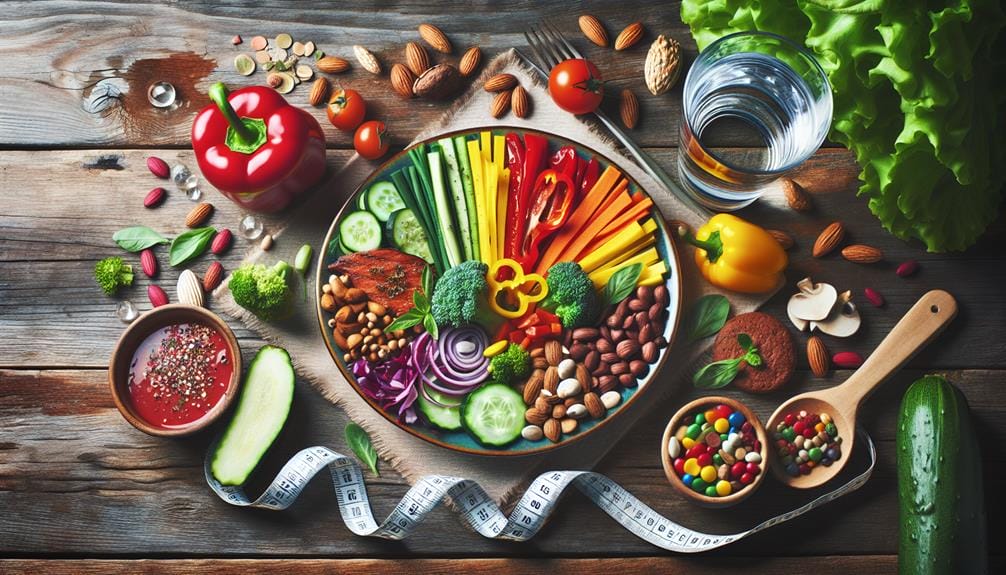
Why is maintaining a healthy weight so crucial for your overall well-being?
Well, imagine trying to run a marathon with a backpack full of bricks. Not fun, right? Carrying extra weight can lead to heart disease, diabetes, and a lot of other not-so-fun health issues.
A balanced diet is your secret weapon in weight management. By focusing on nutrient-dense foods and controlling portion sizes, you can keep those extra pounds at bay. Think of it as a game where fruits, veggies, lean proteins, and whole grains are your MVPs.
Avoiding excessive sugars, saturated fats, and processed foods will make your body thank you. So, eat smart, live well, and let your healthy weight be your bragging right!
Boosting Energy Levels
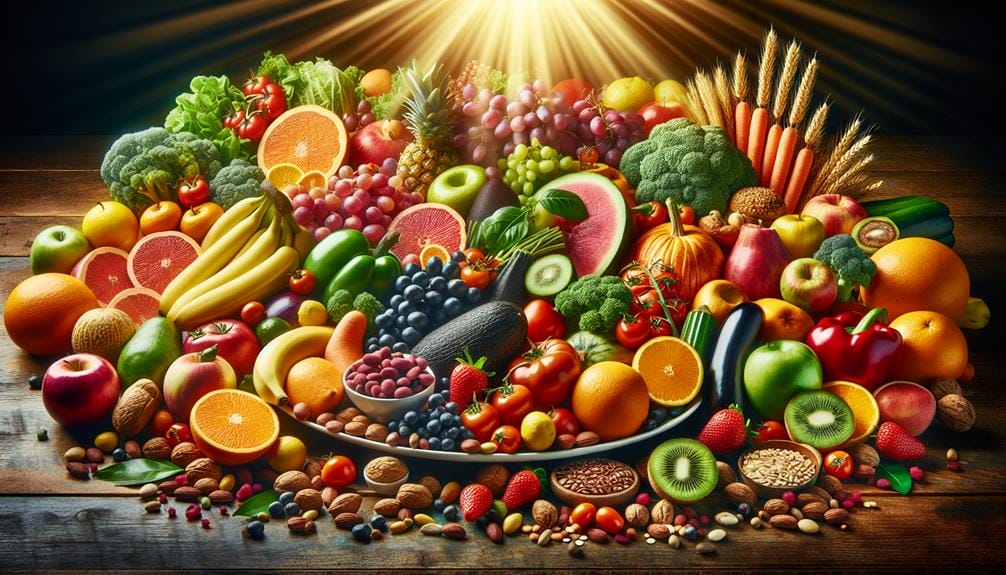
To boost your energy levels, focus on nutrient-dense food choices like lean proteins, whole grains, and healthy fats. These foods provide the sustained energy release you need to stay active throughout the day.
Additionally, staying hydrated and including iron-rich foods in your diet can help prevent fatigue and support overall well-being.
Nutrient-Dense Food Choices
Choosing nutrient-dense foods like fruits, vegetables, lean proteins, and whole grains can greatly enhance your energy levels. With balanced meals, you can achieve peak energy and top energy levels without feeling like a snack monster.
Here's how you can power up your day:
- Fruit Fiesta: Packed with vitamins and antioxidants, fruits can give you a quick energy boost without the crash.
- Veggie Power: Vegetables provide essential nutrients and fiber to keep you feeling full and energized.
- Lean Protein: Think chicken, fish, or beans. These proteins help build and repair tissues, keeping you strong and steady.
- Whole Grains: Oats, quinoa, and brown rice release energy slowly, ensuring you don't fizzle out by mid-morning.
Choose wisely and stay energized!
Sustained Energy Release
Maintaining a steady energy level throughout the day hinges on consuming balanced meals that release nutrients gradually. Think of it as feeding your inner superhero—no cape required!
Eating whole grains, lean proteins, and fruits provides a slow, steady release of energy, unlike sugary snacks that spike your blood sugar levels faster than a roller coaster ride. Balanced meals are your ticket to avoiding those dreaded afternoon energy crashes.
Pair proteins with healthy fats and complex carbs to keep your energy levels humming smoothly. And don't forget to hydrate; even superheroes need water.
Supporting Immune System
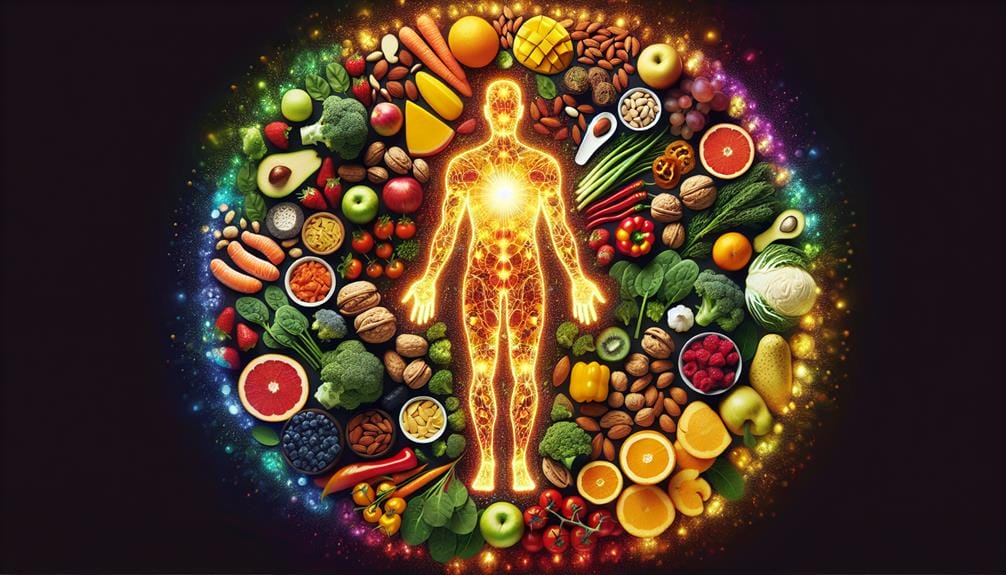
Eating a balanced diet rich in vitamins, minerals, and antioxidants strengthens your immune system, helping you stay healthy and fight off infections.
To keep your immune system in top shape, consider these four tips:
- Load up on fruits and veggies: They're packed with vitamins and minerals that your immune system loves. Think of them as your personal bodyguards.
- Include lean proteins: Your body needs protein to produce antibodies. So, go ahead and enjoy that chicken breast!
- Don't forget probiotics: Foods like yogurt and kefir can boost gut health, which is closely linked to immunity. Plus, they're delicious.
- Vitamin C is your friend: Citrus fruits and bell peppers are great sources. They're basically giving your immune system a high-five.
Reducing Chronic Disease Risk

Incorporating nutrient-rich foods into your diet can greatly reduce the risk of chronic diseases such as heart disease and diabetes.
Choosing a variety of fruits, vegetables, whole grains, lean proteins, and healthy fats provides essential nutrients and anti-inflammatory benefits.
These choices help control weight, blood pressure, and cholesterol levels, promoting overall health and well-being.
Nutrient-Rich Food Choices
Choosing nutrient-rich foods can dramatically lower your risk of chronic diseases like heart disease, diabetes, and cancer. By incorporating a variety of fruits and vegetables, lean proteins, and healthy fats into your diet, you're not just eating; you're giving your body the VIP treatment it deserves.
Here's your cheat sheet to a nutrient-rich diet:
- Fruits and Vegetables: Aim for a colorful plate. Think of it as a rainbow you can eat.
- Lean Proteins: Chicken, fish, tofu—take your pick. Just keep it lean.
- Whole Grains: Go for brown rice, quinoa, or whole wheat bread.
- Healthy Fats: Avocados, nuts, olive oil—your heart will thank you.
Anti-Inflammatory Benefits
By focusing on an anti-inflammatory diet, you can significantly reduce your risk of chronic diseases and improve your overall health.
Imagine chomping on omega-3 fatty acids from fish, flaxseeds, and walnuts—your body's inflammation fighters.
Toss in some turmeric, that golden spice of life, known for its powerful anti-inflammatory benefits.
Chronic inflammation doesn't stand a chance against a plate filled with ginger, green tea, and dark leafy greens.
And let's not forget, kicking processed foods, refined sugars, and trans fats to the curb can keep inflammation and chronic diseases at bay.
Importance of Fruits and Vegetables

Fruits and vegetables pack a punch of essential vitamins, minerals, and antioxidants that are crucial for your overall health. They're like the superstars of the food world, making you feel like a superhero every day.
Here's why you should load up your plate with these colorful wonders:
- Lower Disease Risk: Eating at least 5 portions daily can reduce your risk of obesity, heart disease, and stroke.
- Nutrient Variety: Different colored fruits and vegetables offer a range of health benefits due to their unique nutrient profiles.
- Versatility: You can enjoy them fresh, frozen, canned, dried, or juiced.
- Healthy Body Function: Including a variety of these foods ensures you're getting necessary nutrients for your body to function efficiently.
Role of Proteins
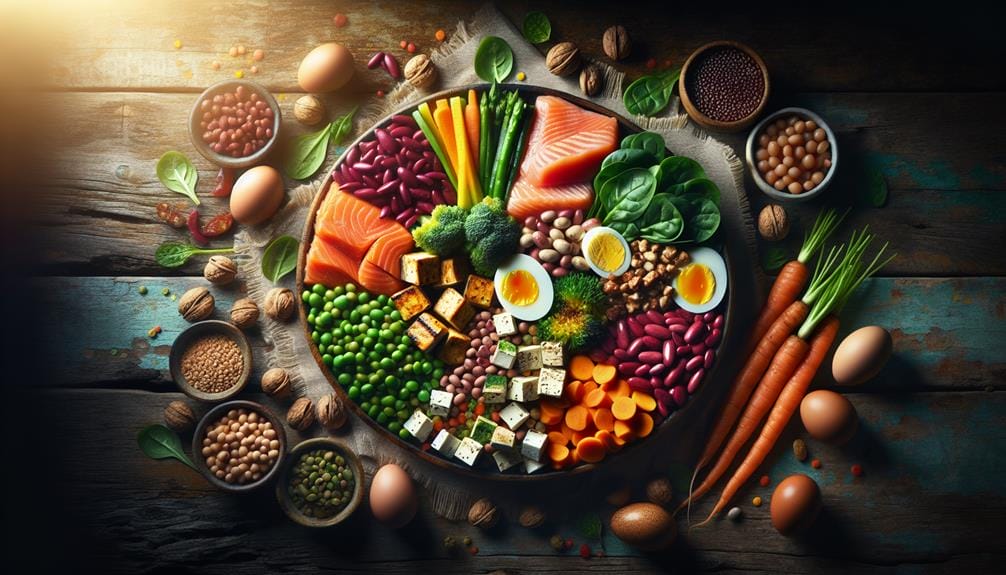
Proteins are vital macronutrients that help build and repair your body's tissues. Think of them as the construction crew for your muscles, organs, and even your hair.
Protein-rich foods like meat, fish, eggs, legumes, and nuts pack a punch of these essential amino acids. You need all 20 amino acids, but some are called 'essential' because your body can't make them—so you gotta eat them!
Whether you're aiming for muscle growth or just want to keep your immune system in top shape, a variety of protein sources is key. So, next time you're eyeing that burger, remember, it's not just tasty—it's helping you stay strong and healthy.
Dairy and Alternatives
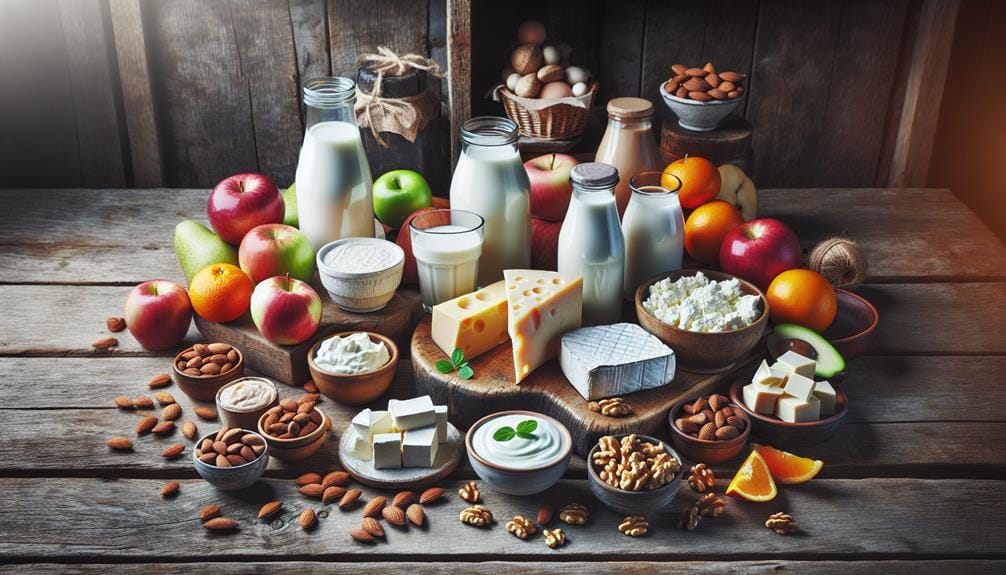
Dairy products and their alternatives play a crucial role in providing your body with essential nutrients like protein and calcium. Whether you're a milk lover or prefer to moo-ve towards plant-based options, both can fit into a balanced diet.
Consider these tips to make the most out of your dairy or dairy alternatives:
- Opt for unsweetened, calcium-fortified options – They pack a nutrient punch without the added sugar.
- Choose lower-fat versions – Keeping it light helps maintain a balanced diet without sacrificing taste.
- Explore soya drinks and other dairy alternatives – Perfect for those with lactose intolerance or a passion for plants.
- Moderation is key – Enjoy your dairy delights or alternatives without overdoing it.
Healthy Fats and Oils
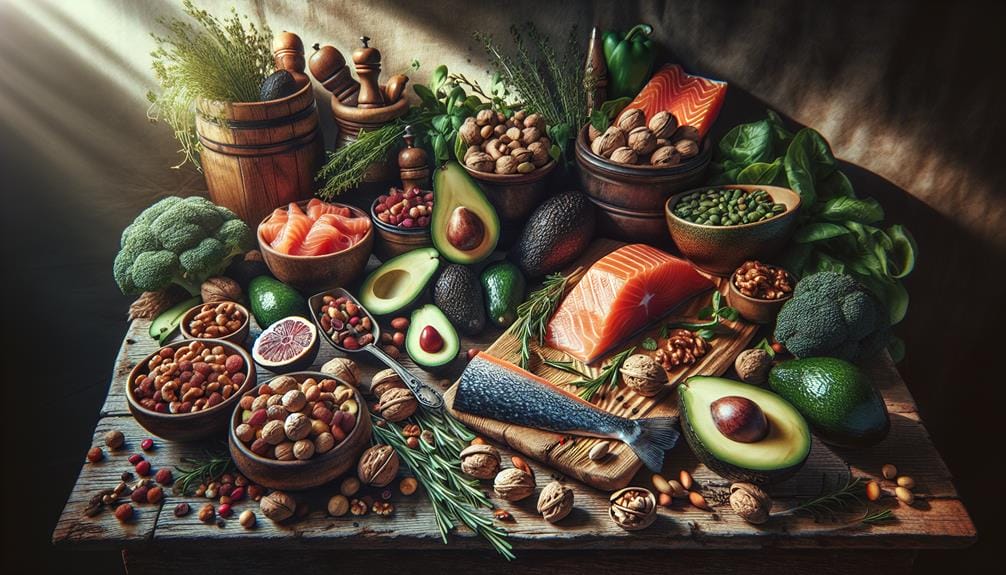
When it comes to maintaining a balanced diet, incorporating healthy fats and oils can greatly enhance your overall well-being. Don't fear the fat! Healthy fats, like unsaturated fats found in olive oil, nuts, and avocados, should be your new best friends. They can help lower your risk of heart disease and keep your body functioning smoothly.
Limiting Saturated Fat, Sugar, and Salt
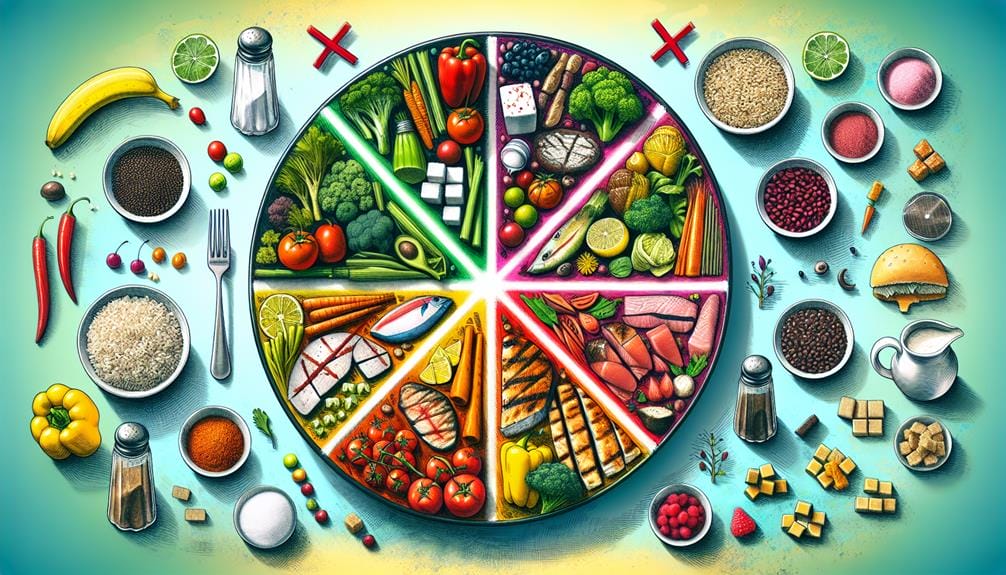
Everyone benefits from limiting saturated fat, sugar, and salt to maintain a healthy and balanced diet. Trust me, your heart and waistline will thank you.
Here are some reasons why you should cut back on the unhealthy trio:
- Saturated fats: Keeping these below 10% of your energy intake helps reduce heart disease and stroke risks.
- Sugar consumption: Limiting it to under 10% of your energy intake prevents obesity and keeps your diet on the right track.
- Salt intake: Stick to less than 5g per day to lower hypertension and cardiovascular disease risk.
- Healthy weight: Choosing unsaturated fats over saturated ones supports maintaining a healthy weight and reduces disease risks.
Tips for a Balanced Diet

Achieving a balanced diet is easier when you include a variety of food groups and practice portion control. Imagine your plate as a pie chart—not the dessert kind—filled with half fruits and veggies, a quarter grains, and a quarter protein.
Opt for healthy diet choices like unsaturated fats over saturated ones; your heart will thank you. Keep an eye on added sugars—they're sneaky little things that can derail your efforts faster than you can say 'cupcake.'
And while we're at it, hydration is key. Water should be your best friend. So, next time you're meal planning, remember: variety, portion control, and a dash of humor make the best recipe for a balanced diet!
Conclusion
In summary, a balanced diet is essential for good health and well-being. Did you know that 75% of Americans don't eat enough fruits and vegetables?
By including essential nutrients, you'll not only maintain a healthy weight but also boost your energy levels. Remember to incorporate healthy fats, limit saturated fats, sugar, and salt.
Follow these tips for a balanced diet to make sure you're getting the nutrients you need for a healthy lifestyle.
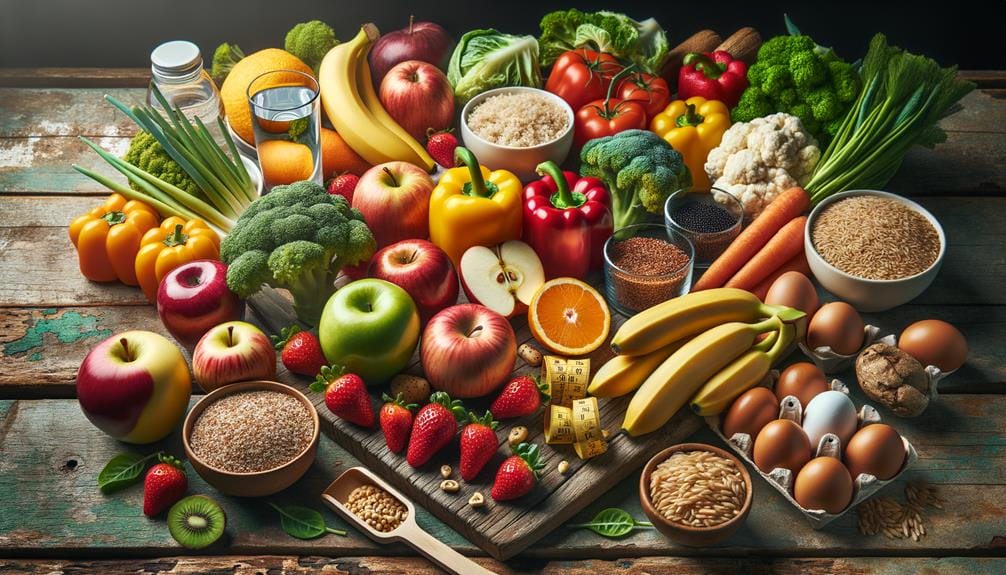


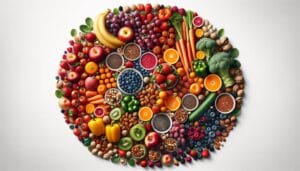





Leave a Comment